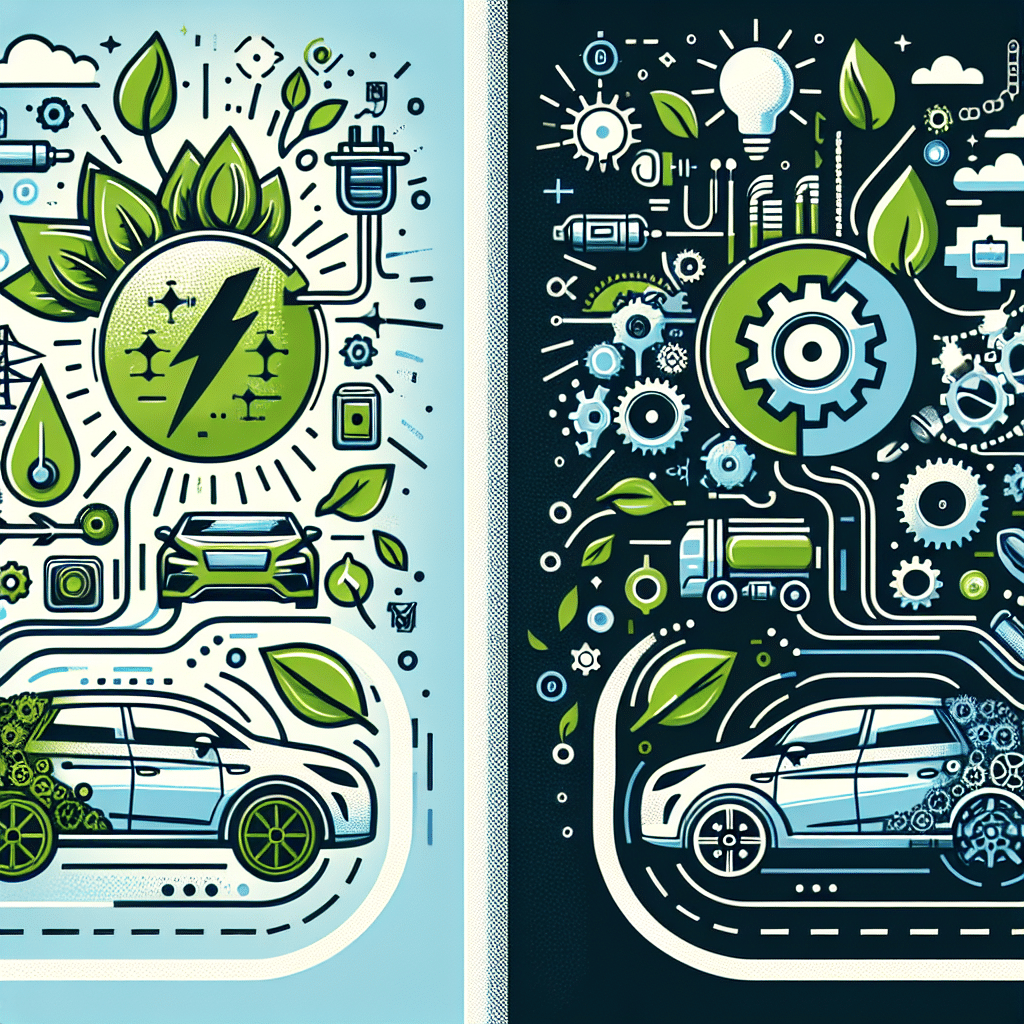Electric Cars vs. Hybrid Cars: A Comprehensive Comparison
Definition and Mechanism
Electric Cars (EVs) are vehicles powered solely by electricity, utilizing electric motors and battery packs as their primary source of energy. The batteries are recharged through various means, including home charging stations, public charging networks, or regenerative braking systems.
Hybrid Cars, on the other hand, combine both an internal combustion engine (ICE) and an electric motor. This dual system allows hybrids to use the electric motor at lower speeds or for short distances, switching to the gasoline engine as needed for higher speeds or longer trips.
Types of Electric Cars
- Battery Electric Vehicles (BEVs): These are pure electric vehicles that rely completely on electric power.
- Plug-in Hybrid Electric Vehicles (PHEVs): PHEVs feature both an electric motor and an ICE, offering the ability to charge via a plug while also using gasoline.
- Fuel Cell Electric Vehicles (FCEVs): These employ hydrogen fuel cells to generate electricity, producing only water vapor as exhaust.
Efficiency and Fuel Economy
Electric Cars
- Efficiency: Electric vehicles are known for their high efficiency, converting over 60% of the electrical energy from the grid to power at the wheels.
- Fuel Economy: Measured in miles per gallon of gasoline equivalent (MPGe), many modern EVs achieve an impressive range—often between 100 and 370 MPGe.
Hybrid Cars
- Efficiency: Hybrids are generally less efficient than pure electric models but outperform traditional ICE vehicles. They often convert 30%-50% of energy from gasoline to movement.
- Fuel Economy: Depending on the driving conditions, many hybrids achieve between 40-60 mpg, especially in city driving where electric motors can be used more frequently.
Environmental Considerations
Electric Cars
- Zero Emissions: Since EVs produce no tailpipe emissions, they are considered environmentally friendly, particularly when charged from renewable energy sources like wind or solar.
- Life Cycle Impact: However, the production of batteries can have significant environmental impacts, including mining and energy use, sparking concerns about sustainability.
Hybrid Cars
- Reduced Emissions: Hybrids produce lower emissions than traditional vehicles, as they can operate solely on electric power for short trips, which reduces their overall carbon footprint.
- Battery Use: While hybrids also utilize batteries, they typically employ smaller ones than EVs, thus reducing the environmental burden associated with battery production.
Driving Range and Refueling
Electric Cars
- Range Anxiety: Many EVs offer driving ranges typically between 150 to 370 miles per charge. While rapidly improving, range limitations can cause anxiety for consumers, particularly on long trips.
- Charging Time: Charging can take significantly longer than refueling. Fast charging can replenish around 80% of an EV’s battery in 30 minutes, while standard home charging might take several hours.
Hybrid Cars
- Extended Range: Hybrids generally provide a broader range due to the combined power sources. Most hybrids can travel over 600 miles on a single tank of gas and a partially charged battery.
- Quick Refueling: Refueling only takes a few minutes, similar to conventional gasoline vehicles, which can be advantageous for long-distance travelers.
Maintenance and Ownership Costs
Electric Cars
- Lower Maintenance: EVs typically have fewer moving parts, leading to reduced maintenance costs over time. There are no oil changes, fuel filters, spark plugs, or exhaust systems to maintain.
- Ownership Costs: While EVs may have higher upfront costs, many states offer incentives and rebates. Additionally, lower fuel costs and maintenance expenses can lead to substantial savings long-term.
Hybrid Cars
- Moderate Maintenance: While hybrids also have fewer moving parts than conventional vehicles, they require maintenance for both the electric and gasoline systems, possibly increasing long-term costs. However, they remain cheaper to maintain than traditional gas vehicles.
- Ownership Costs: Similar to EVs, hybrids may qualify for tax credits. Overall, they are generally more affordable than EVs, making them accessible to a broader audience.
Technological Advancements
Electric Cars
- Smart Features: Modern EVs are often equipped with advanced technology for autonomous driving, connectivity, and enhanced safety systems.
- Battery Development: Research into solid-state batteries and faster-charging technologies continues to improve EV performance and consumer confidence.
Hybrid Cars
- Adaptive Technologies: Hybrids utilize regenerative braking and advanced power management systems to optimize fuel efficiency and smooth transitions between power sources.
- Integration of Features: Many hybrids incorporate the same technological advancements found in EVs, offering a blend of performance and efficiency.
Market Availability and Consumer Choices
Electric Cars
- Growing Options: The market for electric vehicles is rapidly expanding with numerous manufacturers offering a wide range of models, from compact cars to luxury SUVs.
- Targeted Demographics: Mainly attracts environmentally conscious consumers and tech enthusiasts interested in leading-edge automotive technologies.
Hybrid Cars
- Diverse Models: Hybrids are available from numerous manufacturers and are found across various sizes and types, often appealing to consumers seeking better fuel economy without fully committing to electric power.
- Broader Appeal: Hybrids cater to a diverse range of consumers, particularly those hesitant to switch completely to electric due to range concerns.
Conclusion
Electric and hybrid cars each have distinct advantages and disadvantages. EVs score high on sustainability and efficiency, making them ideal for eco-conscious consumers. In contrast, hybrids offer the versatility of gasoline-powered driving with improved fuel economy. The choice between them ultimately lies in individual needs, driving patterns, and personal preferences in sustainability and technology.
